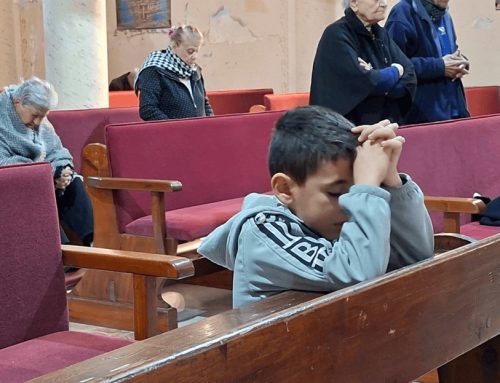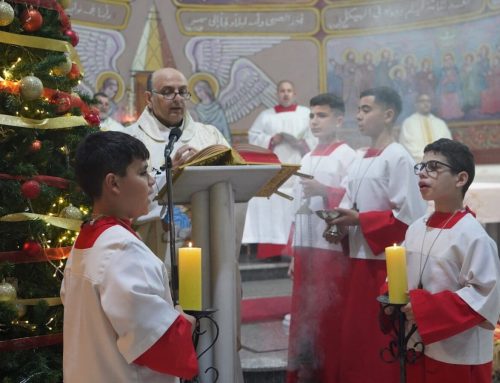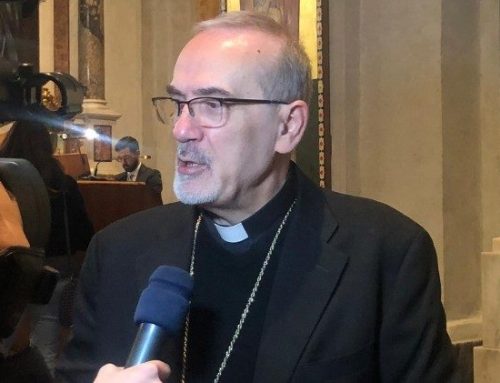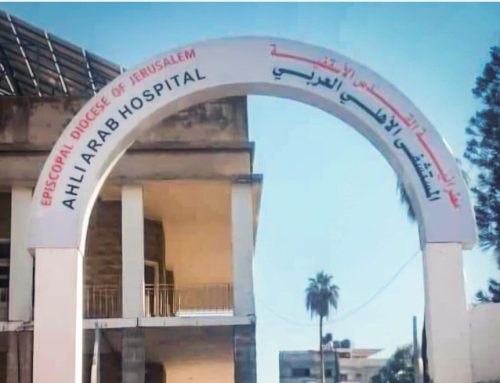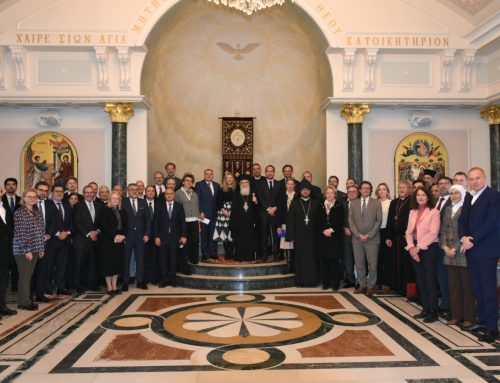
Greetings from Palestine! I wish I could say my journey to get here was a pleasant one. Sadly, due to my Palestinian Arab background, it was deliberately made a very difficult experience, one which is shared by thousands of others, and repeated every day. Maybe you read our recent press release about our 3rd Delegation of the Know Thy Heritage (KTH)Leadership Program, one of HCEF’s many programs in the Holy Land. Included was a brief reference to our arduous 7-hour crossing from Jordan into Palestine on the King Hussein/Allenby bridge–a process that normally ought to take no more than an hour and a half–and the humiliating treatment this crossing entailed.
Although the crossing was, for the brave and energetic youth of the KTH Delegation, a sobering and invaluable highlight of their journey to experience the Palestinian everyday reality, the treatment we experienced ought never to be a part of anyone’s daily reality! It is up to us as Palestinians in our new homes in the diaspora, and to all people of conscience to make it known to those who can change this systematic abuse.
The borders of Palestine-including the border that the West Bank shares with Jordan and the border which Gaza shares with Egypt-are controlled entirely by the Israeli authorities. Even Christian pilgrims from the USA who journey to the Holy Land are often interrogated by Border Control when they enter by this crossing from Jordan, but the treatment given to those of Palestinian heritage goes beyond, and can only be called a humiliating, oppressive discrimination. There are usually many Palestinian families at the border, with their infants and luggage, which, as is customary, includes a generous plethora of gifts. After their passports are confiscated, ostensibly for background checks and visa processing, they wait and pace for hours, even so long as to run out of food and water to give to their crying children.
Our young Delegates were born and raised in the United States, Australia, Chile, El Salvador, Guatemala and Canada. Normally foreign tour groups are admitted through a separate terminal, and their entry is more streamlined. Nonetheless, due to our Palestinian background, we were not permitted to go through that way, and were instead sent through the terminal used for individual Palestinian travelers. Though our young Delegates accepted to be with their Palestinian brothers and sisters, it is a far more lengthy process to obtain entry visas for a group of 42 as individuals than it is to do so for a family of five, for example. Like so many travelers with Arab names or appearance, we were held aside after handing over our passports, detained for many hours, followed at long last by invasive, even humiliating questioning: Who is your father? And your father’s father? Where did he live? Are you quite sure that’s his name? Do you have any family in Palestine? What are their names? Their children’s names? Are you sure that your name is Carlos? What is your e-mail address? Your cell-phone number? I am sure you can imagine the fear and confusion the youth felt, especially the majority for whom this was their first entry in Palestine! “Why did they take our passports? What if they deny us entry?” they asked me, anxiously.
It seems the worst treatment is reserved for diaspora Palestinians who have the audacity to return to the country which was confiscated from their grandparents. Regardless of where they were raised, the Israeli Border Control treats Palestinians with distrust and contempt. I go to Palestine four times per year. Usually I am asked a few questions, but issued a visa within two hours. This crossing was the worst I have been through. Though I have been interrogated by both Border Control and the military security, I’ve never been held so long. One by one the youth were issued visas and released, at long intervals, and I was among the very last. Even the Israeli-American soldier who interrogated me–a young girl from California–said she didn’t even understand why she had to ask me those questions, and that we ought to have been sent to the terminal for tour groups, but the matter was out of her hands and the decision was up to Border Control; she is just doing her job: two years of military service. Over an hour later and after yet another interrogation, this time by Border Control, the young soldier saw us still there and was shocked by how long we were detained. “You shouldn’t still be here!” she told us.
After the mere hour and a half which it took to process our passports in Jordan, with no questions asked, we had arrived at the Israeli Border Control on the King Hussein/Allenby Bridge at 10:00 AM. When we finally got through the Israeli terminal into Palestine, it was 5:00 PM–hours after the terminal’s normal closing time. I was at last issued my visa and permitted to join the youth who had been waiting outside on the bus. As the last few of us exited the terminal, we saw that it was dark and vacant of all employees, except perhaps those hidden behind closed doors and watching us through the security cameras.
Friends, this is the Palestinians’ every day. I know you share my indignation and sympathy for the victims of such unjust oppression. Please share your voice as well, to make a difference and change this intolerable status quo. That’s why I am sharing my story and the story of the 41 young delegates who experienced it with me. When will the Israeli authorities stop profiling Palestinians for no reason?
Warmest Regards,

Sir Rateb Y. Rabie, KCHS
HCEF President/CEO

